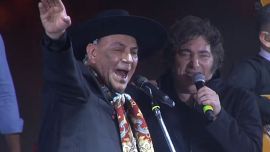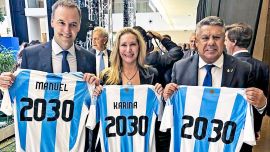Uruguayans elect their next president Sunday with polls suggesting the centre-right National Party is on course to end 15 years of left-wing rule, delivering another power shift to a troubled region.
With allusions to the economic crisis in neighbouring Argentina, calls to unity, and crossing of harsh critics, the two hopefuls closed their campaigns on Wednesday. Former senator Luís Lacalle Pou, the son of a former president, is currently favourite to become Uruguay’s next leader.
A career politician with almost two decades experience in Congress – and a failed bid for the presidency in 2014 also on his record – Lacalle Pou has made restoring investor confidence via spending cuts a key policy proposal. Advisers to the opposition candidate promise to reduce wasteful spending by US$900 million in 2020 alone.
The 46-year-old lawyer highlighted the “urgency” of solving problems, necessities, and “worries” of the Uruguayan population, who cite insecurity as their main concern in a country confronting a public safety crisis as 2018 saw a record 414 homicides.
Building a coalition of opposition parties ranging from the right to leftist social-democrats, polls indicate Lacalle Pou should receive over 50 percent of the vote in Sunday’s elections.
“We are five parties, one commitment to the country. That is what we’re going to accomplish,” he promised in front of thousands of supporters at his closing campaign rally this week.
RIVAL
In contrast, former mayor of Montevideo and engineer Daniel Martínez, attacked his rivals, stating they had united “only to face” his party and denying they would deliver a “stable coalition.”
The Frente Amplio (“Broad Front”) candidate has been reminding voters of his party’s longer record, dating back to 2005. Yet his party’s popularity has not helped the presidential hopeful in accruing more votes.
Martínez represents the more moderate and centre-left wing of the Broad Front, which is a coalition of social democrats, communists, Christian democrats and former guerrilla members.
Martínez earned the most votes in the first round in October, topping Lacalle Pou 39 percent to 29 percent. But in the days that followed, Lacalle Pou formed an alliance with the Partido Colorado, which earned 12 percent in the first round, with Cabildo Abierta that scored 11 percent and with two smaller parties, each of which earned one percent.
If Lacalle Pou wins Sunday, the coalition’s lifespan will depend to a large degree on his performance as president, political scientist and consultant Fernanda Boidi told Bloomberg this week.
“If the government doesn’t do well there are incentives to leave earlier,” she said. “As we approach the next election cycle coalition leaders would have more of an incentive to break away from Lacalle Pou.
Despite support from Argentine President-elect Alberto Fernández, Martínez has been unable to secure the support of additional parties. Fernández met with party leader and President Tabaré Vasdquéz on November 14 and formally endorsed Martínez’s candidacy. The two have been in contact, with Martínez pointing to his close relationship with the Argentine official up to the closure of his campaign.
Voting is obligatory for Uruguay’s 2.7 million registered voters. Polls close at 7.30pm local time, with preliminary results expected later tomorrow evening.
The winner will start his five-year
term March 1, 2020.related news





















Comments